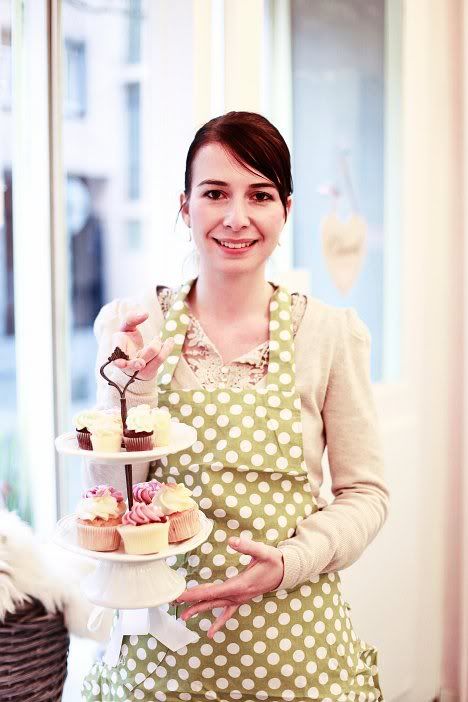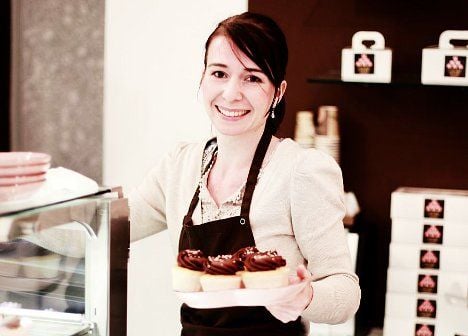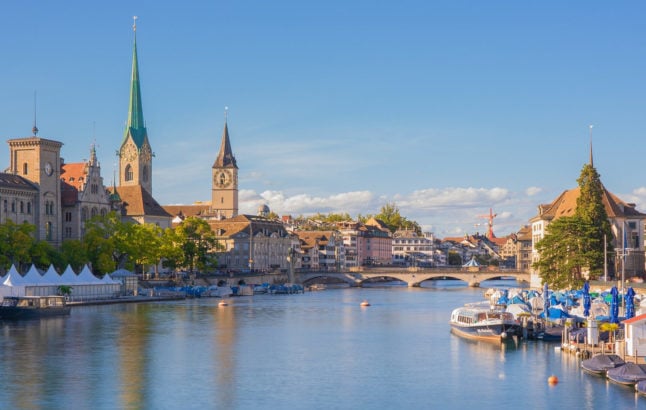When Melanie Studer left England to come home to Switzerland, she brought back a new passion: cupcakes.
As she toiled away at her regular day job, she couldn’t get those little cakes out of her head. She dreamed about opening her own store to serve the cupcake-deprived Swiss, who, like her, typically discover the treat on trips abroad.
“It’s a product that one falls in love with,” Studer says. “One sees it and says, how cute, how pretty.”
She also had a feeling that other Swiss might like them. Her instinct proved right. A little over a year ago, she opened the first cupcake shop in Zurich, Cupcake Affair, and was greeted with a line of clients snaking outside the door.

Forget traditional Swiss classics like fruit flans or jam cookies. The cupcake is now the country’s reigning “it” dessert: the treat is showing up in bakery and grocery shelves, at corporate events and birthday parties, and was even recently celebrated in the pages of one of the big Sunday papers.
People are willing to pay a lot for these treats. A mini cupcake (one or two bites) is usually priced above three francs ($3.30), while a regular size one goes for five francs and up.
It should come as no surprise then that cupcake entrepreneurs are rushing to open online businesses and cupcake boutiques in a number of Swiss towns, including Geneva, Lausanne, Basel, Bern and Zurich. Some of the country’s best-known bakeries are adding cupcakes to their line-up, including Vollenweider in Winterthur and Honold in Zurich.
The country’s biggest retailers are also getting in on the cupcake craze. Supermarket chain Migros is offering a four-part course (at a cost of 90 francs) on the art of baking cupcakes. Not to be outdone, rival Coop’s Betty Bossi brand offers information and tips on cupcakes on its website.
Despite their growing popularity, cupcakes are still a novelty here in Switzerland. There is confusion, for example, about what the difference is between a cupcake and a muffin. There is also uncertainty about when one should eat a cupcake, with one bakery recommending it for breakfast. Some people even wander into Studer’s shop thinking she is selling soap.
So what is it about this sweet import that has tickled Swiss taste buds? Swiss paper NZZ am Sonntag suggests it’s not about the taste – describing them as mere Madeleines — but instead the cutesy packaging. Their vibrant colours and kitschy decorations make them very different from traditional Swiss desserts.
Indeed, Studer of Cupcake Affair says she thought she would have to be “careful” with using bright colours like blue and green for the cupcake’s frosting but the Swiss proved her wrong. Her little boutique in Zurich’s old town features cheery, colourful cupcakes enclosed under glass domes in the front window.
She has stuck with some traditional North-American cupcake flavours, like vanilla cake with chocolate icing, or Red Velvet (a red-coloured cake). But she has also added her own distinctly Swiss twist, offering Tiramisu, chestnut and poppy seed versions. She likes the chocolates ones, as do her customers, who have made the Marilyn Monroe – a chocolate cake with raspberry icing – her best seller.
Her client base, surprisingly, is mostly Swiss. It seems like the kind of place that expats would frequent, but she admits they find the prices too high. She has made some adjustments for local tastes making the icing less sweet and more creamy and light.
Business is still booming. On a recent Saturday, there were three workers behind the small counter as adults waited patiently for their treats.
Cupcakes are also proving to be a hit in the French part of Switzerland. Cupcakes & the City, a cupcake boutique in Geneva, opened its doors in 2009. It has since added another boutique and café in a suburb of the city.
The founder and manager, Christiane Tarab-Pictet herself is a recent cupcake convert. The press relations consultant was looking for a new professional challenge when she came across a story about cupcake shops in Paris. Though she hadn’t even sampled a cupcake, she liked the look of them and thought they wouldn’t be too complicated to make.
At the beginning, the cupcakes were a real curiosity for her customers, according Tarab-Pictet. But Cupcakes & the City realized it would also have to adapt the product to Swiss sweet-tooths.
That meant offering toppings like mousse along with butter cream and sugar icing. The store also found people preferred smaller portions, and introduced the minis that are now the bestseller.
Cupcakes & the City aims to offer seasonal flavours, like chocolate or chestnut in the winter and fruit in the summer.
The business has expanded into offering cupcake-decorating parties for children, and has plans to develop customized cupcakes for businesses.
Since Cupcakes & the City launched two years ago, the dessert has become a lot better known, Tarab-Pictet says. Her fellow cupcake enthusiast in Zurich hopes they stick around.
“Maybe they’ll become part of the regular pastry selection in Switzerland,” Studer says.




 Please whitelist us to continue reading.
Please whitelist us to continue reading.
Member comments